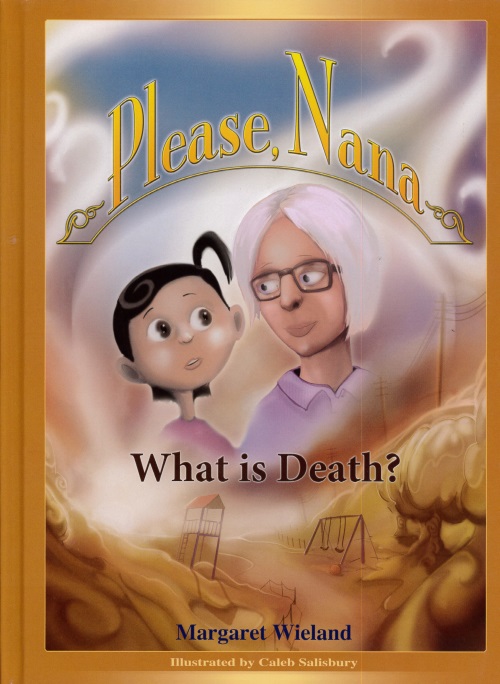Understanding death
Answering the question, ‘Why does God allow bad things to happen?’

Most of us came to a harsh realization of our mortality, even as children. It’s a very gloomy prospect to comprehend that we will all eventually die. And I know from crushing personal experience that this sometimes happens to our loved ones sooner rather than later.
None of us like death. Whether someone has lived a full life or dies ‘too young’, we grieve at their passing. The pain of loss causes us to ponder probably the most asked question—‘Why?’ ‘Why are we here if it is just to become nothing more than dust?’ And, ‘Why me?’ or perhaps, ‘Why us?’ In my experience, most Christians also struggle with this question. We might wonder why our loving and all-powerful Creator God would allow any of His precious children to suffer, sometimes in agony, before the end eventually comes.
Indeed, it is not a pretty picture, and there is tragic evidence that many have turned their backs on God because of the death of a loved one, or seeing a horrific international disaster that just did not make sense to them. But this struggle with the meaning of death is made far worse when people, including Christians, buy into an evolutionary understanding of death—often without even realizing it! If we do this, we can unwittingly accept some of its spurious concepts, including the idea that death is natural. As such, we might not provide satisfactory answers to others.
A straightforward answer is found in Genesis. It provides a correct biblical understanding of history, rather than the false evolutionary one. Moreover, we can find great joy in realizing that our Creator God knows our plight, and actually has done something about it.
Evolution: death is ‘just natural’
Almost everybody has been subjected to an evolutionary/long-age view of the world at some stage. That is, all organisms have danced to the tune of death and struggle over millions of years. This story constantly invades our lives in our education, the news, and even in children’s literature. This ‘deep-time death’ theme is a form of indoctrination; hence its widespread acceptance. For example, evolutionary astronomer Carl Sagan said in one episode of his immensely popular TV science series, Cosmos: “The secrets of evolution are time and death. There’s an unbroken thread that stretches from those first cells to us.”1
His view, like most scientists today, merely echoed what Charles Darwin popularized in his famous book On the Origin of Species. Darwin wrote, “Thus, from the war of nature, from famine and death, the most exalted object which we are capable of conceiving, namely, the production of the higher animals, directly follows.”2
There has been much written about Darwin’s motivation for his theory. He struggled with the premature death of three of his children. And many commentators say that the death of his beloved 10-year-old daughter, Annie, finally destroyed any vestiges of Christian faith he had. He stopped attending church—something that I have seen many Christians do after losing loved ones. Darwin concluded that the world was ages old and concluded that death had been here since the beginning. In this view, ‘God’ becomes the author of death and suffering and a cruel ogre. Death became king to Darwin, rather than the One who has the power over life and death (Revelation 1:18).
We see this ‘death is king’ theme even in popular movies. The hugely influential science fiction author H.G. Wells (1866–1946) was a rabid evolutionist who trained under ‘Darwin’s bulldog’ Thomas Huxley.3 The 2005 Stephen Spielberg remake of H.G. Wells’ classic science fiction tale, The War of the Worlds, stays true to its evolutionary precepts of death and struggle. But I wonder how many could see Wells’ anti-Christian ideas coming through? It employs the idea of older (on the evolutionary scale), and therefore more technologically advanced, Martians attacking the earth with the aim of exterminating mankind. Wells wrote how these ‘superior aliens’ viewed humans: “No one would have believed in the last years of the nineteenth century that this world was being watched keenly and closely by intelligences greater than man’s and yet as mortal as his own; that as men busied themselves about their various concerns they were scrutinised and studied, perhaps almost as narrowly as a man with a microscope might scrutinise the transient creatures that swarm and multiply in a drop of water.” (emphasis mine).
In short, humans were nothing more than lower evolved creatures to be made extinct by a superior species. At the climax of the movie, humanity is spared because the Martians die from contracting a basic earthly disease to which humans are immune. The movie (paraphrasing Wells) stated, “At the toll of a billion deaths, man had earned his immunity, his right to survive amongst this planet’s infinite organisms. Because no man lives, or dies, in vain.” The hero was ‘time and death’—evolution! But in this view, we actually do die in vain. There is no future hope for the individual beyond the grave.
Two contrasting histories of death
In the evolutionary view, death is a good thing; otherwise we would not be here to discuss why we are here in the first place!4 When we see death all around us, whether in the natural world such as by earthquakes and tsunamis, or in the atrocities committed by human beings upon one another, most Christians just seem to accept that such things are a ‘natural’ happenstance and that God is remote. But don’t buy into this. We need to renew our minds and think biblically. “Do not conform any longer to the pattern of this world, but be transformed by the renewing of your mind. Then you will be able to test and approve what God’s will is—his good, pleasing and perfect will” (Romans 12:2).
When we view such things through the lens of Scripture, these ‘bad things’ should serve as a strong reminder that something is tragically wrong with this Creation.
In the beginning, God describes His finished Creation as “very good” (Genesis 1:31). Contrasting with evolution, the Bible describes death as an enemy to humans, which will ultimately be destroyed (1 Corinthians 15:26). Death cannot be natural or ‘good’ if it was not part of God’s original creation of mankind. Scripture is very clear that there was no death and struggle prior to mankind’s rejection of Him via Adam and Eve (Romans 5:12).5
It’s sin!
Whether it is man’s inhumanity to his fellow kind, or the unstoppable rampage of natural disasters, the root cause is the same. It is sin! (The wages of sin is death—Romans 6:23). In Genesis we read that not only was humankind cursed, but it was the whole creation and everything in it. Even the very ground was cursed (Genesis 3:17). This is reinforced in the New Testament. Romans 8:20–22 says, “For the creation was subjected to futility, not willingly, but because of Him who subjected it in hope; because the creation itself also will be delivered from the bondage of corruption into the glorious liberty of the children of God. For we know that the whole creation groans and labors with birth pangs together until now” (NKJV).
And what is the hope that this NT passage talks about? It refers to a new, restored ‘good’ creation where death will be no more (Revelation 21:4). To restore something means to return it to its original condition.
Not only does this help us understand why there is ‘death all around us’, but it underlines the grave importance of, and need for, the Gospel of Jesus Christ. If we have a correct view of death that is built upon the proper Genesis foundation of history, it can help us understand, and, furthermore answer for others, those big questions of life such as, ‘What happens to me when I die?’ and ‘Why is there death and suffering if God is good?’
For believers—death is now a good thing!
God created humans to display His glory and to have eternal fellowship with Him. In short, we would have lived forever. But, because our sin marred us, living forever would have eternally separated us from God. We were also the pinnacle of His creation and were given dominion and, thus, great responsibility over the Creation (Genesis 1:28). Our actions corrupted His whole Creation.
This is where the Gospel—the very sacrifice of Jesus in all its power—is majestically shown. When God instituted the Curse of death, it actually provided a way for human beings to be rescued from this fallen world and to be reconciled back to their Creator. Isn’t it incredible to think that even though we messed up His Creation, the Creator Himself left His Glory, and suffered the disgrace of our actions by dying on a cross in our place?
In an episode of Cosmos Carl Sagan also said, “Somewhere, something incredible is waiting to be known.” How correct he was. He was actually pondering those big questions, but sadly, because of his evolutionary view of death, he was blinded to the simple and plain truth of the Gospel. He apparently died an atheist, and tragically will now endure a ‘second death’ as an unbeliever (Revelation 2:11; 20:6; 20:14; 21:8).
‘Why not me?’
Jesus said that God causes the rain to fall on the righteous and the unrighteous (Matthew 5:45).6 Both believers and non-believers all share this same sin-cursed planet, and there is nothing we can do of ourselves to save ourselves from the effects of it.
The difference for believers is that God has indeed done something about their condition and all the death and suffering in this world. He sent Jesus (John 3:16)!
This is how God’s grace and mercy manifested itself to us. Grace has been described as unmerited favour. How true!
So, instead of asking ‘Why me?’, perhaps we should be asking ‘Why not me?’—and be thankful that God indeed has done something about the terrible legacy of death.
Re-posted on homepage: 17 November 2021
References and notes
- Segments from the TV shows of both Sagan and David Attenborough, featuring statements endorsing evolution, have been put to music in a video series called Symphony of Science. This one of Sagan’s is in the episode titled The Unbroken Thread. Return to text.
- Darwin, C., The Origin of Species, Sixth Edition, p. 463, Everyman’s Library, London and New York, 1956. Return to text.
- See Darwin’s bulldog—Thomas H. Huxley; creation.com/huxley. Return to text.
- There is a problem for those who reject evolution but accept the alleged geologic record of millions of years. The rock layers reveal countless fossils showing death and suffering of creatures. If the millions of years for the layers are correct then death would have been something that God has permitted well before any human appeared and hence before sin. This violates the necessity for the Gospel and a Saviour. Return to text.
- Though this verse in context specifically zeroes in on human death, the Scripture unmistakably indicates that this applied to all nephesh (soulish) life. See Sarfati, J., The Fall: a cosmic catastrophe, J. Creation 19(3):60–64, December 2005; creation.com/plant_death (including the ‘further reading’ web articles listed there). Return to text.
- This applies equally to rain as a blessing (e.g. watering crops, where unbelievers share in ‘common grace’) or a disaster (e.g. flood damage). Return to text.










Readers’ comments
Comments are automatically closed 14 days after publication.